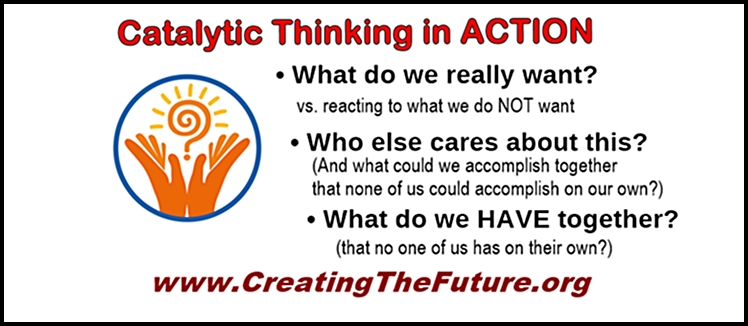Creating the Future hosts several online communities, currently housed at Facebook. Our “big tent” group is for folks who want more exposure to and practice with Catalytic Thinking. It is appropriately called the Catalytic Thinking in Action group.
As that group has grown, there has been a growing need for facilitation to make the experience in that group more meaningful – to turn a “group” into a “community.” To that end, members of that group gathered to apply Catalytic Thinking to the group itself!
The following are the questions that were asked, and the answers the group came up with. For a list of all the Catalytic Thinking questions, click here.
NOTE: If you are not already a member of the Catalytic Thinking in Action group, we hope you will consider joining us by clicking here.
Who will be affected by whatever happens in this group?
– People in the group
– People they connect with in their lives / their ripples
– People sharing on Facebook AND other platforms
– People who take online courses at Creating the Future, who are encouraged to join the group via those classes
– People who learn about the group from our newsletter
High Potential Outcomes:
What does this group make possible for all those people (especially the people in the group)?
– Safety – to share, to be vulnerable. I won’t be called out or made to feel stupid. I’ll be honored and helped. Sense of anonymity, for people who want to lurk and learn quietly.
– Stimulates thinking and creativity, especially when I’m not feeling very creative / thoughtful
– Sense of belonging – my tribe
– A place of practice – to practice Catalytic thinking, and to see it in action in others (including the way the group is facilitated)
– Brain trust – what am I missing / not seeing? Help fill in my thinking
– Action learning – a place to put theory into action, with real life problems, right now
– Place of learning – finding new ideas, new ways of thinking / new questions to consider
– Moving beyond binary thinking
Conditions for success
What must people feel / hear / see / experience / know / be assured of, in order for those outcomes to be realized?
– Inclusion and equity – intentional, meaningful inclusion – race, age, ability
– Intentional consideration of learning styles
– Structures, routines, rituals, traditions
– Intentional structures for connection
– Ask people what they are seeking from the group
– Invite questions
– Structures for Welcoming people
– “You are VERY welcome here”
– Introduce people, welcome them, invite them to share who they are / their story
– We want you to be involved in any way you want to be involved
– People need to see conversation happening
– People need to be pulled into conversations they may not see (FB algorithms, too busy overall)
– Engage with conversations, highlighting things that stand out through the lens of Catalytic Thinking
– People need to see consistently…
– Topic areas (family questions, work questions, community questions) / perhaps an “Issue of the week”
– Events / rituals
– Live events – conversations re: a particular issue
– Facilitators modeling Catalytic Thinking
– Reminders of the principles and practices of Catalytic Thinking
– Reminders of the agreements re: how we be with each other
– People sharing what shifts have occurred as they practice with Catalytic Thinking
– Facilitators paying attention to people acting counter to the group’s agreements
Roles and Functions that will create those conditions
From those conditions, the following are possible actions that can be taken – roles and functions that will create the “conditions for success” that the group discussed.
– Welcomer: admits new members to the group, welcomes new members, invites them to tell about themselves. “If you’ve arrived here from a class, what questions do you have? If you’ve arrived here from the newsletter (or from a friend), what sparked you in that newsletter? Please feel free to watch silently or to dive in – to be here in whatever way feels comfortable for you…”
– Agreements reminder: Monthly (or so) remind folks of the agreements by which the group operates
– Agreements Keepers: Behind the scenes addressing issues that arise when people do not follow the agreements
– Catalytic Thinking / Learning Keepers: Designing education programs that address issues that have arisen in the group. Reinforcing Catalytic Thinking in every post
– Conversation keepers: engage with posts, like every post, highlight the questions / comments that align with Catalytic Thinking, “Here’s what I’m seeing in what you wrote… / This is really powerful; tell me more about X…” Make sure questions are being answered.
– Ritual Keepers: Whatever rituals arise, people to consistently apply those rituals (e.g. It’s Wednesday, be sure to ask a question to get people thinking / It’s Friday, be sure to ask X / It’s Monday, be sure to ask Y)
– Conversation Sparkers: Ensuring new ideas / questions are being sparked. “X scenario happened this week in the news (or to me personally, or etc.). What questions would you ask to apply Catalytic Thinking to this situation?” etc.
– Connectors: Tag people you know in posts that they would be good to participate in / tag people in posts that are getting very little traction.
The next step in this process is simple – inviting people to take on those roles, and getting started! And of course, noting anything in this review that is missing, or ideas sparked by the actual conversation (listen to that conversation here). We hope you will join us, because the party is just getting started!!


Excellent summary (and hosting) Hildy.